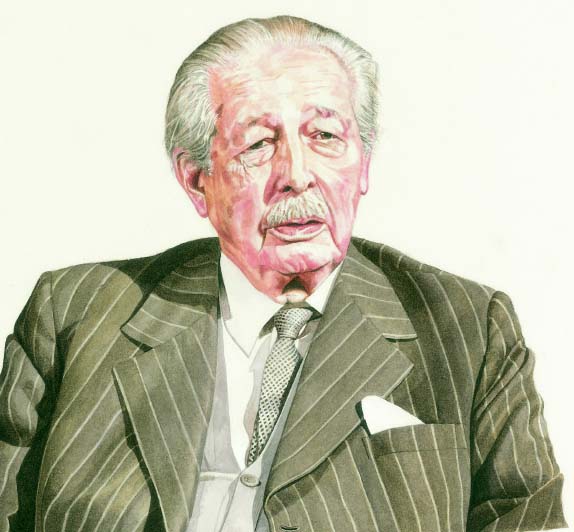Above Detail from a painting of Macmillan by British artist Mark George, specially commissioned by Focal Point
The new book by
Mark Deavin:
Mark Deavin:
(publication summer
1998)
About the author Dr Mark Deavin took an Honours B.A. in international history and politics at the University of Leeds in 1987, obtained a Masters degree at Leeds with distinction in European Studies, then took his Ph.D at the London School of Economics. After a brief flirtation with right-wing politics he has settled down to become a leading historian of the Harold Macmillan era.
IN THIS BOOK new British historian Mark Deavin unmasks Harold Macmillan -- from the beginning of his political career back in the 1920's -- as a dedicated internationalist and Soviet sympathizer. Macmillan may have mixed in the same pre-war circles as Churchill but he was less of an opportunist and more of a cunning, committed ideologue. His methods were well displayed in his long-standing friendship and collaboration with leading financiers like Alfred Mond, Israel Moses Sieff, Robert Waley Cohen, and Edward Beddington Behrens (the latter acted as Macmillan's advisers through unofficial bodies like the Round Table group, Political and Economic Planning (PEP), The Focus, and the Parliamentary Council for Refugees (well-documented as a Zionist front).
Like his internationalist friends, Macmillan wanted to see an end to the dismantling of the British empire (something he worked tirelessly to put into practice as Prime Minister). Working inside a trans-Atlantic network of groups and individuals throughout propagandist for the creation of regional economic and political federations as a basis of global governance. It was out of these schemes that the movement for European integration developed after 1945 and I show how Macmillan played a key role in pushing Britain towards membership both as a minister under the Churchill and Eden governments and, most significantly, when he became Prime Minister in 1957. The 1961 British application to join the European Community was a direct consequence of his activity in this respect.
"Utilizing a British Academy scholarship," writes author Deavin, "my research took me five years to complete and amounts. I made use of over twenty-five collections of private paper and unpublished diaries in Britain, Belgium, Holland, Switzerland and the United States, in addition to the various government and presidential archieves, uncovering quantities of previously undiscovered material. In Britain, for example, I persuaded Alistair Horne to let me see his own copies of Macmillan's unbublished private diaries (which are still officially closed at the time of this writing) and these provide a wealth of valuable information which Horne failed to use in his official biography of the former prime minister."
In Lusanne, Switzerland, Deavin was given unprecedented access to the private archive of that extremely influential, but also underestimated, international éminence grise Jean Monnet. The Monnet papers proved to be a goldmine of important new information.
In the United States he discovered significant new material relating to the scandalous manner in which the Central Intelligence Agency bought off European politicians during and after the Second World War, and to the CIA's involvement in the creation of the European Community. He was also granted privileged access to the vast and untapped archive of the Ford Foundation in New York; this provided further invaluable evidence of the extent to which British politicians, including Macmillan, were acting under American -- or at least American-based -- financial influences. "In the private diaries of David Bruce, the American ambassador to London after 1960," states Deavin, "I moreover uncovered material which sheds a startling new light on the Profumo Affair and on Macmillan's involvement in it, particularly relating to his illicit connections with the Soviet embassy in London."
